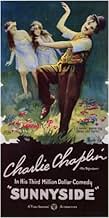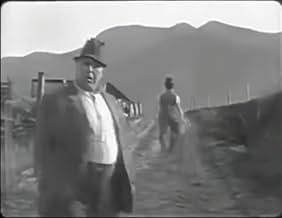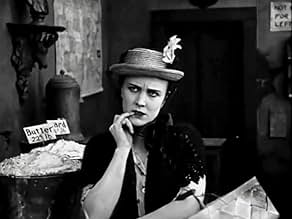Ajouter une intrigue dans votre langueCharlie works on a farm from 4am to late at night. He gets his food on the run (milking a cow into his coffee, holding an chicken over the frying pan to get fried eggs). He loves the neighbo... Tout lireCharlie works on a farm from 4am to late at night. He gets his food on the run (milking a cow into his coffee, holding an chicken over the frying pan to get fried eggs). He loves the neighbor's daughter Edna but is disliked by her father. He rides a cow into a stream and is kicke... Tout lireCharlie works on a farm from 4am to late at night. He gets his food on the run (milking a cow into his coffee, holding an chicken over the frying pan to get fried eggs). He loves the neighbor's daughter Edna but is disliked by her father. He rides a cow into a stream and is kicked off. Unconscious, he dreams of a nymph dance. Back in reality a city slicker is hurt in ... Tout lire
- Réalisation
- Scénario
- Casting principal
- Farm Handyman
- (as Charlie Chaplin)
- Nymph
- (non crédité)
- Slicker
- (non crédité)
- Villager and Edna's Father
- (non crédité)
- Small Role
- (non crédité)
- Nymph
- (non crédité)
- Nymph
- (non crédité)
- Small Role
- (non crédité)
- Small Role
- (non crédité)
- Small Role
- (non crédité)
- Small Role
- (non crédité)
- Fat Man
- (non crédité)
- Small Role
- (non crédité)
- Nymph
- (non crédité)
- Small Role
- (non crédité)
- Young Man from the City
- (non crédité)
- Fat Boy's Father
- (non crédité)
Avis à la une
Chaplin had practically invented the narrative slapstick comedy, but here he belittles the storytelling aspects that were now a comedy standard, curtailing descriptions of characters and places with "etc, etc, etc" and using a title card to bluntly announce the romantic subplot. Throughout the picture he makes use of his now most clichéd plot devices – the abused employee, the sophisticated love rival, the "it-was-all-a-dream" revelation – and, of course, numerous examples of his stock slapstick manoeuvre, the kick up the arse.
And yet, it appears Chaplin was incapable of deliberately making a bad picture. There are plenty of decent gags here, especially those at the beginning where Charlie thwarts his employer's attempts to get him out of bed. And even at the height of his sarcasm and hyperbole it seems Chaplin cannot help but work in gags and sub-gags which are genuinely funny. And for all its narrative laziness, Sunnyside is actually strong in its visual storytelling, beginning with the iris on the church spire to set the tone, then opening up the iris to reveal an exquisitely balanced shot of the village. And even the rushed ending is among Chaplin's sweetest in its delicate imagery.
And there's more; the all important statistic – Number of kicks up the arse: 24 (2 for, 22 against – can this be a record?)
Rather than his usual tramp character, Charlie plays a put-upon farmhand and handyman who has some of the same characteristics, and the story combines some conventional slapstick with some more imaginative sequences. Some of the material is quite good, especially the sequence with Charlie and the horse doctor treating a patient. But not all of it comes off equally well, and it bogs down at times. It's only average among Chaplin's many short comedies, and not quite as good as most of the later ones, but it has enough to be worth seeing.
Some people were disappointed that Chaplin forced the Tramp into the unlikely role of a farmhand, forgetting that the very nature of the Tramp is that he is such an everyman that he can be placed in virtually every different kind of situation, from brick-layer to World War I soldier, and Chaplin can use his particular brand of comedy to deliver his clever political themes and brilliant slapstick.
Some of the situations and sequences don't work so well or run as smoothly as many of Chaplin's more famous ones, and there is a bizarre sequence involving some dancing nymphs, but it is interesting to consider how this early, experimental film foreshadows the work that Chaplin did later in much more famous and highly superior films like City Lights and The Kid. Throughout the film are what may be taken as examples of the exasperation that Chaplin has admitted to having during the production of the film, but to call is a total loss is missing the mark completely. Certainly not the best of Chaplin's early short films, but I don't think Chaplin ever made a real failure.
Le saviez-vous
- AnecdotesIn his autobiography, Charles Chaplin described the making of this film as "like pulling teeth" due to the mental block he suffered as a result of his unhappy marriage to Mildred Harris.
- GaffesIn the first scene, the Farm Handyman's (Charles Chaplin) boss gets up, puts his right shoe on, kicks sleeping Charlie awake, then goes back to bed. He gets up again to throw his other shoe at sleeping Charlie. The third time he gets up, he has both shoes on, even though he never retrieved the shoe he threw.
- Versions alternativesThere is an episode, preserved on the 2003 DVD, of Chaplin attempting to shave Albert Austin with hilarious results. This cut segment can also be seen in Unknown Chaplin (1983).
- ConnexionsFeatured in Charlie: The Life and Art of Charles Chaplin (2003)
Meilleurs choix
Détails
- Durée
- 34min
- Couleur
- Mixage
- Rapport de forme
- 1.33 : 1




























